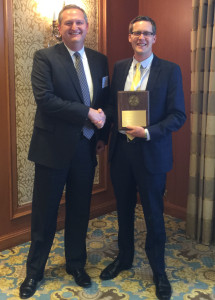Today, the United States Supreme Court agreed that the Constitution granted the liberty “to define and express their identity” by “marrying someone of the same sex and having their marriages deemed lawful on the same terms and conditions as marriages between persons of the opposite sex.” The groundbreaking decision, available here, recognized that the personal choice of who to marry is “inherent in the concept of individual autonomy,” a central concept of the Fourteenth Amendment’s protections of life, liberty and property. Justice Anthony Kennedy, writing for the Court, eloquently summed up the matter in his concluding statement:
“No union is more profound than marriage, for it embodies the highest ideals of love, fidelity, devotion, sacrifice, and family. In forming a marital union, two people become something greater than they once were. As some of the petitioners in these cases demonstrate, marriage embodies a love that may endure even past death. It would misunderstand these men and women to say that they disrespect the idea of marriage. Their plea is that they do respect it, respect it so deeply that they seek to find its fulfillment for themselves. Their hope is not to be condemned to live in loneliness, excluded from one of civilization’s oldest institutions. They ask for equal dignity in the eyes of the law. The Constitution grants them that right.”
The Minnesota Human Rights Act has long recognized the right to equal treatment of individuals regardless of their sexual orientation and sexual identity. It is illegal for an employer to discriminate against an employee based on the employee’s sexual orientation, self-image, and identity. In fact, recognizing that discriminators often try to stigmatize people based on sexual orientation and identity, Minnesota law also prohibits discrimination based on perceived sexual orientation and identity. And, if an employee complains about sexual orientation discrimination, Minnesota law protects them from retaliation.
For more information about the impact of the Supreme Court’s ruling, or employment law protecting the LGBTQ community, please contact us.


